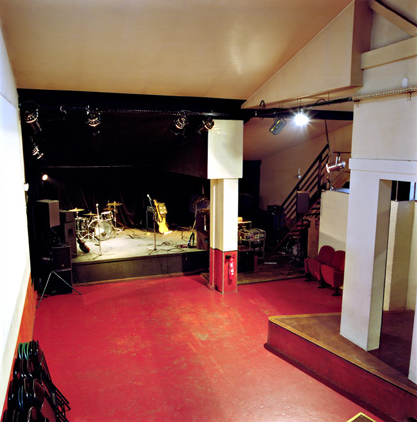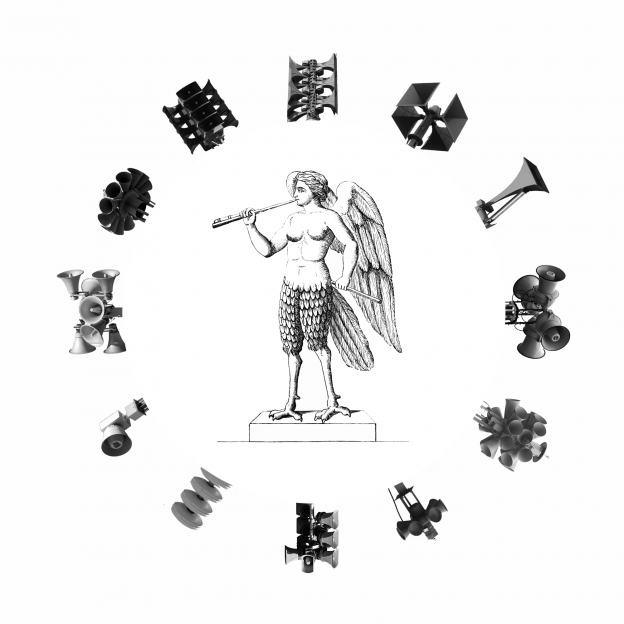2018
“Ideology “acts” or “functions” in such a way that it “recruits” subjects from among individuals (it recruits them all), or “transforms” individuals into subjects (it transforms them all) by the very specific operation known as interpellation that can be thought of in terms of the most straightforward everyday police interpellation (or not): “hey, you, over there!” If we suppose that the imagined theoretical happening takes place in the street, the interpellated individual turns round. By means of this simple 180-degree physical reorganisation, the individual becomes a subject. Why? Because he/she has recognised that the interpellation was indeed directed at him/her and that “it was indeed him/her who was being interpellated” (and not anyone else). […] The existence of ideology and the interpellation of individuals as subjects is one and the same thing.” (L. Althusser, 1970)
A performance by the group Les Sirènes on 23 November 2018 at Instants Chavirés, Montreuil (Paris region), in the form of a questioning of our relationship to auditory injunctions. Elaborated during an in-situ residency in September 2018, the piece takes the form of a dramaturgy composed from various alarm systems, highlighting the way in which they reconfigure space and its use. Transforming a safety evacuation exercise into a listening exercise, the piece acts on sound matter inside the very ears of exhibition visitors.
Les Sirènes is a collective that produces pieces that perform a social criticism of sound. It analyses and questions the auditory myths we’re exposed to, forms of domination or resistance constructed by sound and the way in which sound can produce or destroy that which is held in common. Using both artistic and theoretical tools, Les Sirènes aims to bring about distanced listening experiences that are specific to the spaces in which they are presented. The collective is made up of musician and performer Francisco Meirino, composer and improviser Jérôme Noetinger, artist and academic Matthieu Saladin and researcher and author Juliette Volcler.
« L’idéologie “agit” ou “fonctionne” de telle sorte qu’elle “recrute” des sujets parmi les individus (elle les recrute tous), ou “transforme” les individus en sujets (elle les transforme tous) par cette opération très précise que nous appelons l’interpellation, qu’on peut se représenter sur le type même de la plus banale interpellation policière (ou non) de tous les jours : “hé, vous, là-bas !”. Si nous supposons que la scène théorique imaginée se passe dans la rue, l’individu interpellé se retourne. Par cette simple conversion physique de 180 degrés, il devient sujet. Pourquoi ? Parce qu’il a reconnu que l’interpellation s’adressait “bien” à lui, et que “c’était bien lui qui était interpellé” (et pas un autre). […] C’est une seule et même chose que l’existence de l’idéologie et l’interpellation des individus en sujets. » (L. Althusser, 1970)
Performance du groupe Les Sirènes, le 23 novembre 2018 aux Instants Chavirés, Montreuil, sous la forme d’un questionnement sur notre rapport aux injonctions auditives. Élaborée à l’occasion d’une résidence in situ en septembre 2018, cette intervention compose une dramaturgie à partir de divers dispositifs d’alerte, mettant en évidence la façon dont ils reconfigurent l’espace et son usage. Transformant l’exercice d’évacuation en exercice d’écoute, la pièce travaille la matière sonore à même les oreilles du public.
Les sirènes est un collectif d’intervention sur la critique sociale du son. Il travaille à analyser et questionner les mythes auditifs qui nous traversent, les formes de domination ou de résistance construites par le son et la façon dont ce dernier peut produire ou détruire du commun. Utilisant des outils artistiques aussi bien que théoriques, il vise à susciter des expériences d’écoute distanciées et spécifiques à l’espace dans lequel elles s’inscrivent. Il réunit le musicien et performeur Francisco Meirino, le compositeur et improvisateur Jérôme Noetinger, l’artiste et universitaire Matthieu Saladin, la chercheuse et autrice Juliette Volcler.

